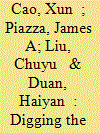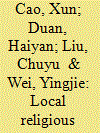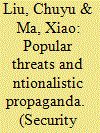|
|
|
Sort Order |
|
|
|
Items / Page
|
|
|
|
|
|
|
| Srl | Item |
| 1 |
ID:
159543


|
|
|
|
|
| Summary/Abstract |
Unrest in the Xinjiang region of China currently poses the most imminent threat to the internal security of China and to central government control over peripheral regions. Instability in Xinjiang, furthermore, has ramifications for the wider security environment in Central Asia as the conflict becomes linked with jihadist groups in other security hotspots, like Pakistan and Syria. However, our understanding of important potential factors affecting political instability in Xinjiang is limited by the lack of systematically collected event data of ethnic violence. In this article, we introduce the first effort to fill this gap in data collection, that is, the Ethnic Violence in China (EVC) Database: the Xinjiang Region. This is a geocoded database of yearly incidents of ethnic violence at the county level in Xinjiang from 1990 to 2005. Using the EVC database, we demonstrate some initial results modeling ethnic violence in Xinjiang. We find that ethnic violence is positively associated with interethnic inequality; resources such as oil and cotton, on the other hand, are unrelated to the likelihood of ethnic violence.
|
|
|
|
|
|
|
|
|
|
|
|
|
|
|
|
| 2 |
ID:
168430


|
|
|
|
|
| Summary/Abstract |
Few civil-conflict studies explore the role played by subnational-level governments, especially the impact of their providing public goods. In this paper, I argue that local governments can mitigate the risk of ethnic conflicts by increasing their provision of public goods. I situate this argument in the context of ongoing ethnic conflicts in Xinjiang, China. With a new data set of 105 ethnic conflicts in Xinjiang between 1997 and 2005, this study finds that counties with higher government spending on education were significantly less likely to experience conflicts. The results are robust to a wide range of robustness checks.
|
|
|
|
|
|
|
|
|
|
|
|
|
|
|
|
| 3 |
ID:
163273


|
|
|
|
|
| Summary/Abstract |
This article studies how local religious institutions mediate the effect of interethnic inequality on local violence. Focusing on the case of Xinjiang, China, we argue that local religious institutions decrease violence caused by local grievances. They do so in two ways: first, they provide local public goods; second, they provide an “information bridge” between the local population and the government, allowing for nonviolent management of potential discontent. We evaluate our claims with a county-level database of incidents of ethnic violence in Xinjiang, China. We measure local interethnic inequalities using education indicators from census data and the strength of religious institutions using local mosque density. We find a conflict-dampening effect of religious institutions: a higher level of interethnic inequality is associated with increased ethnic violence only in areas with low and medium levels of mosque density. This article contributes to the literature of civil conflict, ethnic violence, and political and social unrest by revealing how local institutions mediate the effect of grievances on violence.
|
|
|
|
|
|
|
|
|
|
|
|
|
|
|
|
| 4 |
ID:
166151


|
|
|
|
|
| Summary/Abstract |
In this research note, we introduce a new dataset on China's national legislators. It provides descriptive information on one key parameter: the nature of the business owned by private entrepreneur deputies in China's National People's Congress (NPC) from 2003 to 2017. The dataset contains information on whether the deputy once worked as a government official, whether the deputy was a former top manager of a state-owned/collective enterprise, and whether his/her current company was a state-owned/collective enterprise before being privatized. We categorize deputies as “insiders” as long as they stratify one of the aforementioned backgrounds, whereas others as the “grassroots.” This dataset thus reveals two types of private entrepreneur deputies who are significantly different with regard to how they started their own businesses. These findings shed new light on the relationship between private entrepreneurs and the party-state in China.
|
|
|
|
|
|
|
|
|
|
|
|
|
|
|
|
| 5 |
ID:
163249


|
|
|
|
|
| Summary/Abstract |
Conventional wisdom suggests that authoritarian leaders use nationalist propaganda as a tool to strengthen mass support. Yet few studies have provided systematic evidence to account for specific tactics underlying these information manipulations. We argue that autocrats, recognizing the material costs of propaganda, are more likely to target localities with the greatest antiregime potential. Using a unique dataset of “patriotic education sites” that the Chinese Communist Party assigned throughout China as tools to advance its nationalistic campaign, we found a systematic association between these locations and the scale of antiregime mobilization in the 1989 prodemocracy movement. The longer the antiregime protest lasted in a city in 1989, the greater the number of patriotic education sites the city contains. Our findings highlight the strategic way in which autocrats manipulate nationalist propaganda to mitigate popular threats.
|
|
|
|
|
|
|
|
|
|
|
|
|
|
|
|
| 6 |
ID:
149940


|
|
|
|
|
| Summary/Abstract |
We study wind development at the provincial level in China, modelling installed wind capacities as a function of both economics and politics. We assume that the top provincial officials desire to maximize their chances of promotion under the Chinese cadre evaluation system. We expect that those with the strongest incentives to perform in order to achieve promotion would work harder to comply with the central government’s policy agenda to promote renewable energy. Collecting and testing data on provincial leaders’ characteristics, we find that provinces governed by party secretaries who were approaching the age of 65 are associated with significantly higher level of wind installed capacities. This result supports the political tournaments theory of Chinese politics. We also find that better educated party secretaries are likely to be more supportive of renewable energy, implying that education acts to encourage provincial leaders to support the central government’s policy.
|
|
|
|
|
|
|
|
|
|
|
|
|
|
|
|
|
|
|
|
|